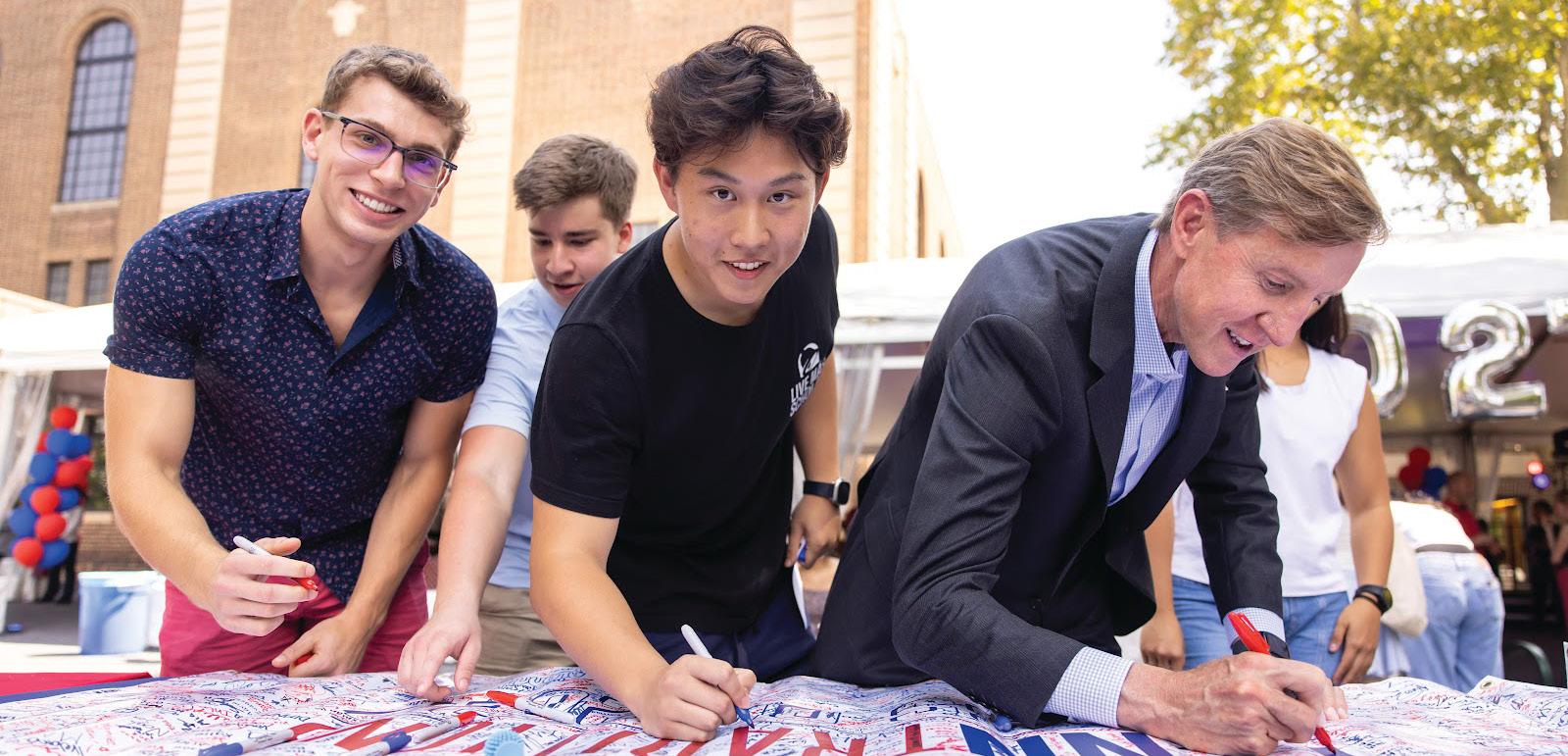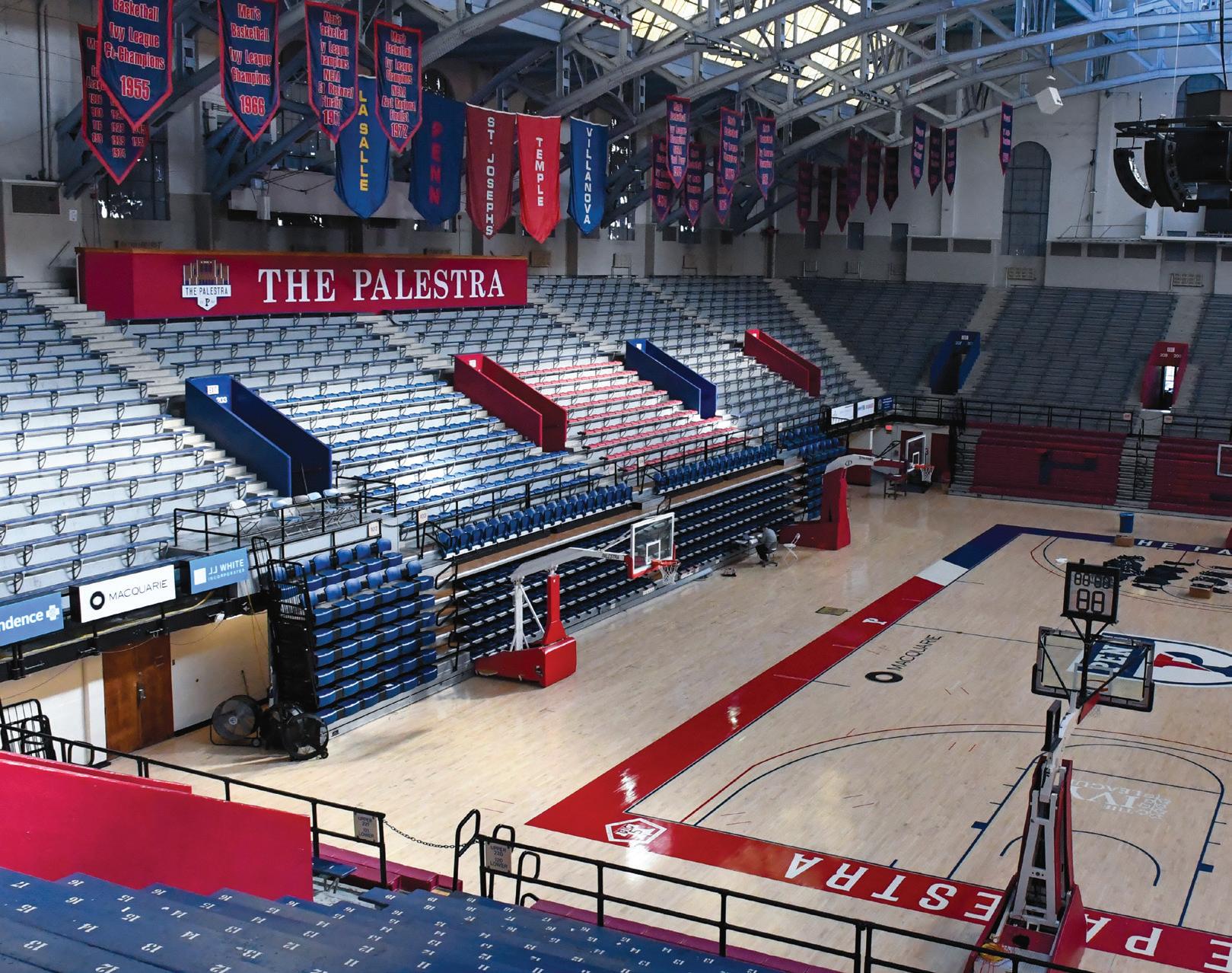INSIDE: PENN RELAYS
Penn updates guidance for international students amid ongoing visa revocations
On April 21, Penn updated its ‘SEVIS Termination FAQ’ website to address additional topics including public safety, academics, and housing for individuals who have been affected by visa revocations and immigration status terminations
FINN RYAN Senior Reporter
Amid ongoing visa revocations, Penn updated its guidance for international students on Monday, adding additional information for individuals whose immigration statuses have changed through the Student and Exchange Visitor Information System.
The Daily Pennsylvanian previously reported that eight Penn affiliates had either their visa revoked or immigration status terminated by the Department of State. Of the eight affiliates, seven had their SEVIS statuses terminated — including one undergraduate student, five graduate students, and one alumnus on a sponsored visa — according to a University spokesperson. One additional Penn affiliate had their visa revoked.
On April 21, Penn updated its “SEVIS Termination FAQ” website to address additional topics including public safety, academics, and housing for individuals who have been impacted by SEVIS terminations. The page — which was first launched by Penn’s International Student and Scholar Services on April 6 — states that a SEVIS revocation indicates that an individual’s “F-1 or J-1 immigration record is no longer active.”
“A terminated SEVIS record means you are out
See ISSS, page 3
Penn spent

Jameson cites institutional neutrality as reason for Penn’s limited response to federal attacks
Other schools across the Ivy League also have institutional neutrality policies, yet some have taken markedly different public stances in criticizing the Trump administration
AYANA CHARI, CHRISTINE OH, AND ANVI SEHGAL Staff Reporters
During an April 17 interview with The Daily Pennsylvanian, Penn President Larry Jameson cited the University’s institutional neutrality policy — which applies to local and global events that do not directly impact Penn — to explain the University’s relatively quiet stance amid federal attacks on higher education.
Across the Ivy League, many of Penn’s seven peer institutions also have policies of institutional neutrality, yet some have taken markedly different public stances in criticizing the administration under 1968 Wharton
$250,000
lobbying federal
government in
first quarter of 2025, most in 25 years
Penn lobbied the federal government on issues including National Institutes of Health funding, research, and graduate medical education
ISHA CHITIRALA Senior Reporter
As the Trump administration continues to escalate its attacks on universities across the country, Penn spent $250,000 lobbying the federal government in the first fiscal quarter of 2025 — the most money the University has spent lobbying the government in a single quarter since 1999.
According to a recently filed disclosure, Penn lobbied the federal government on multiple issues including National Institutes of Health funding, research, graduate medical education, and general matters pertaining to higher education and international students. The record expenditure from Penn comes as the University has continued to increase its spending on lobbying — totaling $640,000 in 2024.
Penn listed Associate Vice President of Federal Affairs William Andresen and Penn Medicine Corporate Director for Government and Community Relations Kristen Molloy as individuals who lobbied on behalf of the University in its lobbying report.
A request for comment was left with a University spokesperson.
The quarter — from Jan. 1 to March 31 — spanned a tumultuous time for the University, which has been targeted by the Trump administration from multiple angles.
In February, the NIH issued a directive capping “indirect costs” — which fund overhead expenses like lab spaces and support staff — at 15%. In a message to the Penn community at the time, then-Interim Penn President Larry


Jameson wrote that the institution could lose up to $240 million as a result of the cuts.
In response, Penn, along with 12 other universities, filed a lawsuit. In an affidavit submitted with the suit, Senior Associate Vice Provost and Senior Associate Vice President for Research Elizabeth Peloso described Penn as one of the nation’s “top” research universities, stating that “vital research at Penn is made possible by funding provided by the NIH.”
Following the NIH cuts, Penn notified graduate departments to reduce admissions at several schools, including the School of Arts and Sciences and the Perelman School of Medicine. In a February email, Interim SAS Dean Jeffrey Kallberg attributed the decision to cut admissions as a “necessary cost-saving measure” in response to potential NIH cuts.
According to the federal lobbying report, Penn also focused lobbying efforts on “international students.” At the time of publication, eight Penn affiliates have been affected by ongoing visa revocations and immigration status terminations at the hands of the Trump administration.
Of the eight affiliates, seven had their SEVIS status terminated — including one undergraduate student, five graduate students, and one alumnus on a sponsored visa — according to a University spokesperson. One additional Penn affiliate had their visa revoked.
See LOBBYING, page 2
graduate and President Donald Trump. The DP compared Penn’s response — and Jameson’s rationale for it — to the other Ivy League universities’ institutional neutrality policies and actions.
A request for comment was left with a Penn spokesperson.
Penn’s policy — introduced in September 2024 — states that the University will “refrain from institutional statements … except for those which have direct and significant bearing on University functions.”
Penn community members have expressed support for the policy, which was designed to restrict commentary on controversial issues that do not directly relate to the University.
“We created a position probably a year ago of institutional restraint with our messaging,” Jameson told the DP. “The point of that which we articulate … is largely so that the institutional voice was not speaking out on
See JAMESON, page 5
Jameson announces winners of 2025 President’s Engagement and Innovation Prizes
All prize recipients collaborate with a Penn faculty mentor, and the projects receive up to $100,000 as well as a $50,000 living stipend for each team member
JOSÉ CARLOS SERRANO Contributing Reporter

Jameson announced the winners of the prizes on April 17.
Penn President Larry Jameson announced the winners of the 2025 President’s Engagement and Innovation Prizes, awarding funding for projects designed to create positive social change.
Established by former Penn President Amy Gutmann in 2015, the prizes are awarded annually to Penn seniors who will undertake post-graduation projects that aim to make a “positive, lasting difference in the world.” All prize recipients collaborate with a Penn faculty mentor, and the projects receive up to $100,000 as well as a $50,000 living stipend for each team member.

“There is a lot of process behind this to select these amazing winners,” Jameson told The Daily Pennsylvanian in an April 17 interview. “I am in total awe as I meet … the incredibly talented people. All of these efforts are intended to spark creativity, teamwork, and collaboration.”




“There
of all started our careers back in the 90s,” Kearns told The Daily Pennsylvanian. “Once we all went out to universities and tech companies everywhere, suddenly we had all
these close friends and colleagues in a very diverse set of places.”
At the event, LeCun spoke on his experience at Bell Labs — which celebrates 100 years since its founding this year — specifically regarding the importance of sharing scientific research.
“[I learned] that when you do science, you publish your work because you need to teach the rest of the world about what you were doing, and also because the currency of your career as a scientist is intellectual impact, and that only comes from publications,” he said.
When LeCun joined Meta 11 years ago to create its first research lab, he also told Mark Zuckerberg, one of the founders of Meta — then known as Facebook — the importance of being transparent with research.
“If we do research, we have to do it in the open,”
LeCun added.
When speaking on computer science pedagogy, LeCun said that some computer science departments were slow to pick up on machine learning. While traditional computer science focused on theory and systems, machine learning was seen as something more “peripheral.”
“Machine learning was this boutique subfield of AI, which at that time was discredited,” Kearns said when speaking about his own experience as a student entering graduate school in the 1980s. “I think that everybody who is from our generation who went into machine learning felt like an outsider for some period of time. The field was just an unusual hybrid of computer science, statistics, engineering, [and] a little bit of neuroscience.”
Despite the hybrid nature of machine learning, Kearns said that people who enter the field will still end up making original contributions.
LeCun also addressed concerns that some people have with AI, including with large language models. While some people have claimed that LLMs would be harmful due to their ability to generate disinformation through social media, LeCun said that he doesn’t see this happen within Meta.
“We see a flood of disinformation, but it is produced by humans … so it’s really a societal problem, not really a technological one at this point,” LeCun said.
LeCun also emphasized that you cannot eliminate


bias from an AI system the same way you cannot eliminate bias from a newspaper. Instead, he said that society needs a wide diversity of AI assistants, giving people the choice of what biases an AI system will have.
“I can’t disagree with his prescription for making things better, which is open-source models, not being opaque, having things out in the open and letting people have a choice,” Kearns told the DP.
Students who attended the event appreciated the diversity of topics discussed.
“[The event was] a really interesting mix. You cover the history of AI from the very inception to the four decades that it spans,” College junior James Huang told the DP. “It’s very nice hearing how his career evolved, alongside the actual societal impact of [AI].”
College junior Tereza Okálová enjoyed how LeCun talked about the limitations of reinforcement learning models being used to present the physical world.
“That is very much a contention that the field of theoretical neuroscience, as well as linguistics, oftentimes have in terms of [how to] best represent how humans learn and create internal representations of the physical world,” Okálová said.
The fireside chat was a part of the 2025 AI Month at Penn, which is aimed at exploring “AI’s impact on human well-being” and focusing on “how AI is shaping health, society and quality of life, while addressing critical issues such as fairness and safe AI practices.”
LOBBYING, from front page
Other Ivy League institutions also reported record expenditures. Yale University and Harvard University spent $250,000 and $230,000 lobbying the federal government in the first quarter, respectively.


The closure — which is due to bankruptcy and is expected to affect 3,000 workers and nearly 75,000 patients — comes after Penn Medicine offered a $5 million cash infux to assume two of the system’s leases
MARGOT SCHNEIDER Senior Reporter
Following months of failed negotiations, Crozer Health filed for bankruptcy and will close its CrozerChester Medical Center and Taylor Hospital in Delaware County.
The motion to close the hospital system was filed on April 21 by parent company Prospect Medical Holdings. The closure — which is expected to be completed within 30 days, affecting 3,000 workers and nearly 75,000 patients — comes after Penn Medicine offered a $5 million cash influx to assume two of the system’s leases.
“We are deeply saddened to hear that Prospect Medical Holdings plans to close Crozer Health,” a Penn Med spokesperson wrote in a statement to The Daily Pennsylvanian. “Earlier this month, we made an offer of $5 million to support Crozer Health’s operations and purchase certain assets associated with Crozer’s Broomall and Brinton Lake outpatient facilities.”
“Despite these efforts, Prospect Medical notified
ISSS, from front page
of status and can’t legally study, work, or remain in the U.S.,” the website states. “Depending on the circumstances, you may begin to accumulate unlawful presence from the date of termination.”
The website notes that the termination of a SEVIS record “typically occurs when a student has decided to withdraw or take a leave from Penn or when a student is no longer in compliance with U.S. immigration regulations.” While terminations initiated by ISSS will trigger “multiple warnings and communications,” other terminations by “external agencies” are completed automatically.
A University spokesperson previously told the DP that ISSS was monitoring students’ visa statuses twice a day through SEVIS. According to the FAQ sheet, automatic terminations are “outside of ISSS’s control” and may be the result of visa revocations, background checks, and criminal matters.
The recent updates come as 1968 Wharton graduate and President Donald Trump’s second
us last week that they rejected our offer,” the spokesperson added. “We are deeply disappointed by this decision, which will have negative impacts for patients and displace many talented health care professionals at a time when health care needs in the community are only increasing.”
In a statement, Prospect said the system was “unable to reach a viable alternative.”
Prospect previously closed two other Pennsylvania hospitals, Delaware County Memorial Hospital and Springfield Hospital, in 2022.
In response to the closure, Delaware County issued an emergency declaration Monday and is in the process of filing an objection to the motion, claiming that Prospect’s actions are “deeply inadequate and do not comply with local law” since a 180-day notice was not provided to the county regarding the closure.
Efforts to save the Crozer system have been ongoing for several months, and Crozer hospitals have received $46 million from local entities. Initially, $20 million in Pennsylvania taxpayer money and $20 million from The Foundation for Delaware County — a community nonprofit organization — were infused into the system to keep it afloat following its initial declaration of bankruptcy.
Subsequently, Prospect set a deadline for an additional $9 million to be procured by April 16 to keep the system afloat. At this time, Penn Med offered $5 million, and Delaware County donated an additional $1 million specifically for mental health services provided to Crozer patients.
Patients have already begun to be diverted and transferred to other hospitals. On Tuesday afternoon, a Temple University Health System helicopter arrived at the Crozer-Chester Medical Center to transfer Crozer patients out of the hospital’s burn unit.
Crozer healthcare workers, patients, and state representatives gathered outside Crozer-Chester Medical Center on Tuesday to protest the closure.
Many shared how devastating the closure would be to the Delaware County community.
“For-profit [organizations] cannot come in and take away all of the rights of the people in a poor
administration continues its nationwide crackdown on international scholars. At the time of publication, over 1,700 international students at and recent graduates of American universities have had their visas revoked.
Depending on a student’s circumstances, ISSS recommends leaving the United States and applying for a new visa and I-20/DS-2019 certificate following a SEVIS termination. The website acknowledges, however, that “[t]erminations linked to visa issues or legal matters may negatively impact future U.S. visa eligibility.”
In the “Public Safety & Penn Police” section of the FAQ sheet, ISSS emphasizes that while Penn Police “does not enforce immigration regulations, including SEVIS,” Penn’s campus is, however, “largely open to the public” and thus “law enforcement officers may enter these public spaces without a warrant or subpoena.”
According to the website, if approached by an immigration official, students and scholars should immediately contact Penn’s Division of Public Safety. The page reiterates the right for students “to remain silent and decline communication.”
Changes to a student’s visa or SEVIS status may

community,” Peggy Malone, a Crozer behavioral health nurse and the president of the Crozer-Chester Nurses Association, said at the April 22 demonstration.
“They may say they’re closing us, and they’re trying to do it so rapidly. What’s going on in the building, trying to get patients out and get patients discharged, it’s unbelievable,” she added.
“They must be held accountable for their reckless actions that have led to today’s announcement,” Pennsylvania Gov. Josh Shapiro told CBS. “Their conduct and mismanagement must be fully reviewed in the bankruptcy legal process to hold them to account under the law, and we must ensure this never happens again by passing legislation to get private equity out of the health care business in Pennsylvania, as I proposed in my budget address earlier this year.”
also impact their “academic status” and ability to attend classes.
Questions 14-17 of the FAQ sheet specifically address financial aid and billing for students. The website urges students to contact ISSS, noting that although “termination may impact eligibility” for financial aid or scholarships, emergency support may be available. Tuition and payment plans for those who cannot attend classes are managed by Penn’s student billing department.
Penn’s on-campus housing options are contingent on a student’s active enrollment during the academic year, according to the page. Following a SEVIS termination, “students must typically vacate within 48 hours.” For those interested in canceling housing contracts or locating summer and off-campus options, ISSS recommends reaching out to Penn Residential Services.
Students with terminated SEVIS records also face limited campus engagement opportunities, as most student clubs and activities “require active enrollment.” Other services, including gyms and counseling, are also only “available to currently enrolled students,” according to the FAQ page.











, from front page
According to the President’s Engagement Prizes website, the prizes “are competitively awarded annually to academically excellent and civically engaged Penn seniors to design and undertake fully-funded local, national, or global engagement projects during the first year after they graduate from Penn.”
The 2025 President’s Engagement Prize was awarded to four Penn seniors. College seniors Ejun Hong and Jack Roney won the prize for founding PIXEL — the “Project for Inspiring eXpression, Education and Leadership” — which aims to connect different creative industries. College seniors Imani Nkrumah Ardayfio, Inaya Zaman, and Rashmi Acharya also won the President’s Engagement Prize for their project “Nourish to Flourish.”
Engineering seniors Melanie Herbert and Alexandra Popescu, along with Wharton and Engineering senior Nami Lindquist, were awarded the President’s Innovation Prize for their project “Sync Labs.” Wharton and Engineering senior Piotr Lazarek won the President’s Sustainability Prize, a subcategory of the President’s Innovation Prize, for “Nirby,” a project intended to counteract inefficiencies in how fertilizer is managed.
“PIXEL, Nourish to Flourish, Sync Labs, and Nirby are interdisciplinary and innovative in their approach,” Jameson told Penn Today. “[They are] engaging in West Philadelphia to inspire creativity and introduce nutritional programs improving health and addressing hunger … [and] innovating to enhance eldercare through AI.”
Provost John Jackson Jr. recognized the recipients for their embodiment of Penn’s strategic framework, “In Principle and Practice,” and work “to lead on the great challenges of our time, foster leadership and service, and deepen connections with our neighbors and the world.”
The teams, chosen from a pool of 68 applicants, will collaborate with a Penn faculty or staff mentor on their work. PIXEL will be mentored by Jarrett Stein, who serves as the director of health partnerships and social ventures for the Netter Center for Community Partnerships. “Nourish to Flourish,” “Sync Labs,” and “Nirby” will receive mentorship from Penn professors Heather Klusaritz and Jeffrey Babin.
“Congratulations to this inspiring group of students,” Jackson added. “[Their] innovative ideas will shape our future.”




SEPTA’s sexy
CHAT WITH CHAHAL | Penn students should use SEPTA more often
I was ready to take on the city of Philadelphia from the moment I stepped foot on Penn’s campus. One of the reasons I chose this school was its connection to a real city — not just in name, but in practice. Growing up in rural California, I didn’t have access to public transportation, let alone a full-blown rail system. So I was genuinely excited to make use of SEPTA, one of the most expansive and historic transit systems in the country.
My new friends and I decided to head into Center City. I was ready to find the closest train station and ride in. To my surprise, they immediately suggested we take an Uber.
-$10.26. “Oh, it’s just a bit expensive today.”
“Let’s head back to campus!” -$9.52. “OK, that’s not as bad, I guess.”
But it didn’t stop there. The suggestions that we should take an Uber to locations off campus didn’t stop, and I let myself fall into the trap of letting it slide. It quickly became obvious to me that Uber was the go-to mode of transportation for Penn students.
-$3.70. -$14.58. -$7.82.
However, while the prices of Uber rides fluctuated, one thing stayed the same: SEPTA was almost always the cheaper, more sustainable, and more community-oriented option.
Beyond personal preference, there’s also a class issue at play. Not everyone at Penn can afford to split a $30 Uber ride just to go to a restaurant in Rittenhouse Square. For many

students, SEPTA isn’t a choice — it’s the only option. And when the default group decision is always Uber, it leaves people out. There’s also an environmental cost. Ridesharing apps increase congestion, emissions, and traffic. SEPTA is the greener, more sustainable option — one we should support if we’re serious about climate justice. Penn has committed itself to reducing carbon emissions, and as students, we must align ourselves with that commitment. Not just because Penn is, but because it is the moral and ethical thing to do, especially given the harm that Penn has caused as a main proponent of gentrification in the Philadelphia community. Let’s do our part as students in helping better this community, not hurt it.
And yes, I know some students have had negative or uncomfortable experiences on public transit. I won’t dismiss that. But it’s worth asking: How much of our discomfort is based on actual danger, and how much is rooted in assumptions or stereotypes about the people who ride it? In 2024, SEPTA was given the highest honor by the American Public Transit Association for safety and security — yet public perception tells a different story. Why? I mean, we all know that often, people who rely on public transit tend to come from low-income backgrounds, which are disproportionately people of color in the Philadelphia community. So the next time you say you don’t want to hop

on a SEPTA train because it’s “ghetto,” think twice about what that actually means in the context of the community around you. But, maybe most importantly: SEPTA connects you to Philadelphia in a way that Uber never can. You see the bustling streets. You meet people who are actually from the West Philadelphia community around you. You hear the city’s soundtrack: the bus driver’s greeting, the trolley’s rumble, the football fanatics chatting about the Philadelphia Eagles. You get to be a part of it all.
The crime we care about IN PERSPECTIVE | On the culture of violence at Penn

Content warning: This article contains descriptions of physical abuse and racial discrimination that may be disturbing and/or triggering for some readers. Somehow, the topic of crime at Penn is inexhaustible. School alerts and news stories instill fear and anger among students regularly. But in conversations about crime on this campus exists one glaring oversight: the kind of crimes committed by Penn students. And I’m not talking about underage drinking, drug possession, or even unnecessary shoplifting. I’m referring to the violent crimes perpetrated by Penn students, the kind left unreported and unprosecuted because of the demographics of those who commit them.
In October, I authored a deeply controversial column about Penn students’ attitudes toward crime in our urban community. While the original point was to argue against gentrification as a remedy for crime, many readers felt that I was diminishing their fears or personal experiences. One even offered this anecdote on Sidechat:

The art
JEAN PARK | MULTIMEDIA EDITOR
“[T]o whatever idiot wrote the dp article about crime at penn not really being that bad.. i literally was chased down 40th to my dorm by two men in masks screaming at me on a weeknight coming back from huntsman.”
I have no idea whether this event actually occurred, but that really isn’t the point. I use the quote above to demonstrate a pattern I’ve noticed: At Penn, we have certain ideas about what crime looks like. It’s masked men chasing you to your dorm. A stalker lurking in the shadows. A threat from an unhoused person outside a convenience store. Penn students never hear “crime” and think of the guy in the back of your class who sexually assaulted someone last weekend. They don’t think about racist assaults at parties. They certainly don’t think about fraternities brutalizing pledges in hazing rituals. It doesn’t matter that all of these highly prevalent occurrences are considered felonies. Somehow, we are different. It seems that we are separated from true “criminals” by iron gates
and branded clothing, and the violence we commit against each other becomes silly antics and drunken indiscretions. But if we are serious about keeping our students safe, we need to reevaluate how we view violence at this institution. Enough with blaming it all on other people — we must weed it out from our own community first.
The violence is here. Sexual assault is the most common crime on American college campuses, making up 44% of all incident reports, and Penn is no outlier. In the 2023-24 academic year, there were 26 reported instances of Penn students engaging in sexual misconduct, including relationship violence, sexual harassment, sexual violence, and stalking. This number is likely an underestimate given the low report rate of sexual violence, especially on college campuses. That’s double the number of alcohol violations, over four times the number of theft reports, and more than vandalism and trespassing instances combined.
How can we say we want to protect student safety when we continue to perpetuate a culture of sexual violence? How on Earth can we see the prevalence of sexual assault and still feel that student safety is most threatened by strangers? Penn students are far more likely to experience an assault of this kind at the hands of a classmate than a random predator on the street.
There is also no shortage of physical assault by students at Penn. While the school has reported no instances of student-committed assaults in the past two years, there were eight in the 2021-22 school year. One of these was the notorious Psi Upsilon fraternity assault, in which a student was beaten into semiconsciousness after he was allegedly called racist slurs. He suffered severe injuries. This event was
HARMAN CHAHAL is a College first year from Modesto, Calif. His email is harmanc@sas.upenn.edu.
predated by numerous assaults against students of color at fraternities, representing a pattern of violent racism at Penn. Not only do Penn students perpetrate the types of violence we fear, but we also create our own depraved kinds. Hazing rituals are perhaps one of the cornerstones of Penn student life, no matter how much the University minimizes their prevalence. The practice doesn’t just exist in greek life — it also bleeds into other clubs and student organizations. It’s one of the most commonly and consistently reported incidents at Penn, with almost 50 complaints filed in the past four years. And while it hasn’t happened at Penn yet, it’s known that hazing violence can escalate quickly, and that it is often deadly. So while there are some instances of crime being committed against Penn students by strangers, there are far more instances of Penn students committing crimes against each other. We must let go of the assumption that violence is more damaging or criminal when it is perpetrated by someone outside of this school. It makes us feel better, safer, to think of crime as something that only exists past 40th Street, outside our college houses guarded by Penn Police. But violence originates at Penn. It lives in dorm rooms and fraternity houses, in hallways and in basements. It is perpetrated by our classmates and friends. Our affiliation with this University doesn’t change the nature of our violence, and it doesn’t mean we do any less harm.
INGRID HOLMQUIST is a College sophomore from Silver Spring, Md. studying urban studies. Her email is ingridhh@sas.upenn.edu.
of self-promotion: Penn practice or plague?
PENN UNSAID | How Penn’s humble-brag culture equally prepares and fails its students
“Confidence is never confident enough.” At a place like Penn, this advice given by my pre-major advisor comes back to haunt me like the plague. These are some really trying times. While the school year comes to a close, there are some daunting questions we must confront. In college, I thought that the hardest questions to answer would be related to where I find meaning or the kind of person I want to become; instead, the most challenging question to answer seems to be: “What are you doing this summer?”
Don’t get me wrong: My gripe does not necessarily concern the high pressure associated with getting an internship. There are already plenty of articles concerning the stress that comes with Penn’s notorious preprofessionalism. It can’t be denied that this type of culture promotes professional success at the cost of passion or mental health, but to a certain extent, preprofessionalism does benefit students in the long run.
In a job market that only gets more competitive as time passes, internships can be crucial in becoming a standout candidate. In actuality, around 90% of Penn students complete at least one internship by graduation compared to the national average of just 60%. But it has quickly dawned on me that an internship is not simply an opportunity here — it’s social currency in the form of “humblebragging.”
The topic of internships seems to come up in all of my conversations, to the point where I can barely get out the “Fine, how are
you?” before someone interrogates me about my summer plans. But these questions don’t seem to come out of genuine curiosity — it’s an interaction that consists of physically sizing up the other person before going in for the kill. Everyone is trying to gauge where their summer plans lie in the internship hierarchy to construct the most impressive version of themselves. In a particular conversation, I can recall moments in which people prefaced their internship discussion by saying, “But it was just a nonprofit” or “only research.” What these conversations have made glaringly obvious to me is that at Penn, we seem to speak our own language. It is not a language of pleasantries, but rather of self-promotion, and consequently,
self-deprecation.
It makes sense that at such an elite university, we’re trained to sell our skills and personalities, whether for career fairs, job interviews, or even in a simple conversation with our professors. Confidence is essential to professional ambition, but this attitude is problematic when it starts melding with our personal lives. No one is alone in thinking that at times, it can almost feel as if other students are trying to learn more about our achievements than our character or interests. There will always be something fundamentally bizarre about those interactions in which I cannot tell the difference between a coffee chat and an actual chat. Admittedly, though, there is a difference between bragging on purpose and by habit. I am

inclined to believe that most Penn students fall into the latter category, including myself. Because our student culture is heavily tied up in careerism and a resume-padding mentality, it’s more likely that students are simply more well versed in small talk than heart-to-heart discussions. Once again, it is true that Penn gives its students an edge in the labor market, with the majority of 2024 graduates from the Wharton School and College of Arts and Sciences possessing a full-time job after graduation. However, the world of corporate speak and industry is merely one aspect of life. Perhaps we should consider that Penn does not necessarily prepare its students as well to have authentic social interactions. There is no obvious solution or quick fix to an issue of inauthenticity that — to many students and faculty — might not feel like an issue at all. Nevertheless, it seems like there are still many students who feel distant from their peers because the relationships they form are either transactional or lack vulnerability. Maybe, if we want to shift our realities, we have to change our literal scripts — to stop pretending to be something we are not, and instead become more confident in who we actually are.
LINDSAY MUNETON is a College sophomore from Bergenfield, N.J. studying sociology. Her email address is lmuneton@sas.upenn.edu.
behalf of the faculty and students and our stakeholders, but rather enabling them to develop their own positions and points of view.”
On April 22, Jameson co-signed a letter from the American Association of Colleges and Universities alongside 150 university presidents and higher education leaders from across the country, urging the federal government to protect and respect the autonomy of higher education institutions. The letter denounced the Trump administration’s “unprecedented government overreach” and “political interference” in higher education and vowed to “reject the coercive use of public research funding.”
Jameson’s previous communication about the impact of federal policies on the University included four messages to the Penn community. The first email, which was sent on Jan. 28, reasserted that the University’s “financial outlook is sound” and that the institution should “continue its essential research” as the Trump administration issued blanket freezes on federal funding and grants.
In February, Jameson highlighted that the University stands to lose $240 million from National Institutes of Health funding cuts — and reiterated Penn’s commitment to “identify solutions to minimize the impact” of the federal action.
A month later — just days after Trump froze $175 million of Penn’s federal funding on March 19 — Jameson wrote that the loss of research jeopardized by these cuts “will be felt by society and individuals far beyond our campus for years to come.” He added that students and faculty at the start of their research careers have expressed serious concerns.
When asked by the DP about calls from faculty and students for Penn to take a firmer stance against the Trump administration, Jameson said that “that’s a point of view that’s being expressed, and I’m listening to it and taking it into consideration.”
Other Ivy League institutions have been more vocal in criticizing the Trump administration despite also having institutional neutrality policies.
Harvard University’s policy of institutional neutrality states that university leaders may not make “official” statements about issues that do not affect the “core function” of the university.
On April 11, the Trump administration sent a list of demands to Harvard, including the elimination of diversity, equity, and inclusion initiatives and a reform of student disciplinary policies. In a letter on April 14, Harvard responded in a letter, stating that it was “not prepared to agree” to demands that exceeded the administration’s “lawful authority.” In response, the administration swiftly announced a freeze on $2.2 billion in multiyear grants to Harvard, prompting the university to file a lawsuit challenging the “unlawful” funding freeze.
Columbia University’s advisory committee on “institutional voice” is set to issue an official report with recommendations for the university’s institutional neutrality policy by the end of the academic year.
The Trump administration initially canceled $400 million in grants to Columbia on March 7, citing the school’s “continued inaction in the face of persistent harassment of Jewish students.” The university agreed to
the administration’s demands on March 21. A week later, then-Interim Columbia President Katrina Armstrong, a 1998 Perelman School of Medicine graduate, resigned.
In April, Acting Columbia President Claire Shipman said the university will “reject heavy-handed orchestration from the government that could potentially damage our institution and undermine useful reforms” in a message that signaled a stronger response from the university.
Yale University — while not endorsing an official policy of institutional neutrality — advises leaders to “generally avoid” making statements that are not directly related to the university, asking them to use their “personal judgment.”
Yale has not issued an official statement regarding the actions of the Trump administration, but several members of the university’s faculty signed a letter challenging the administration’s respect for the “rule of law.”
Princeton University’s leaders have expressed a firm stance against institutional neutrality and established a less restrictive policy of “institutional restraint.”
Before the federal government issued demands to or funding cuts against the university, Princeton President Christopher Eisgruber criticized the Trump administration’s “attack” on Columbia in a piece for The Atlantic. Nearly $4 million for Princeton was frozen on April 10 following Eisgruber’s unwillingness to make concessions to the administration.
In August 2024, then-Interim Cornell President Michael Kotlikoff issued a statement outlining the university’s principles on free speech and institutional neutrality, emphasizing Cornell’s commitment to protecting individual rights to expression while ensuring such speech does not “violate the rights of others.”
The letter marked a formal adoption of institutional neutrality as a guiding administrative principle. In consideration of the “many and diverse views in the Cornell community,” Kotlikoff stated that Cornell’s leaders will “refrain” from issuing statements on events that do not directly impact the university.
In response to recent federal actions taken by the Trump administration, Cornell joined peer institutions in challenging regulations that threaten the university’s research funding. Cornell is part of a multiinstitutional lawsuit against the Department of Energy over a proposed 15% cap on indirect cost recovery for federal research grants.
Brown University’s Public Statements Policy, which was created in 2022, states that the university can make official statements on matters of “direct impact” to the university or higher education.
In response to an announcement from the Trump administration that it would freeze $510 million in grants to Brown, Brown President Christina Paxson signed the joint letter from AAC&U denouncing the Trump administration’s recent federal actions. The university is also a named plaintiff in the federal lawsuit challenging the DOE.
Dartmouth College has a policy of “institutional restraint,” which limits communication from designated spokespersons to “provide space for diverse viewpoints.”
Dartmouth’s president was the sole Ivy League leader to abstain from signing the April 22 letter against the Trump administration’s funding cuts. In an April 23 letter to the Dartmouth community, Dartmouth President Sian Beilock defended the decision, arguing that universities are not “political organizations.”


















































































































